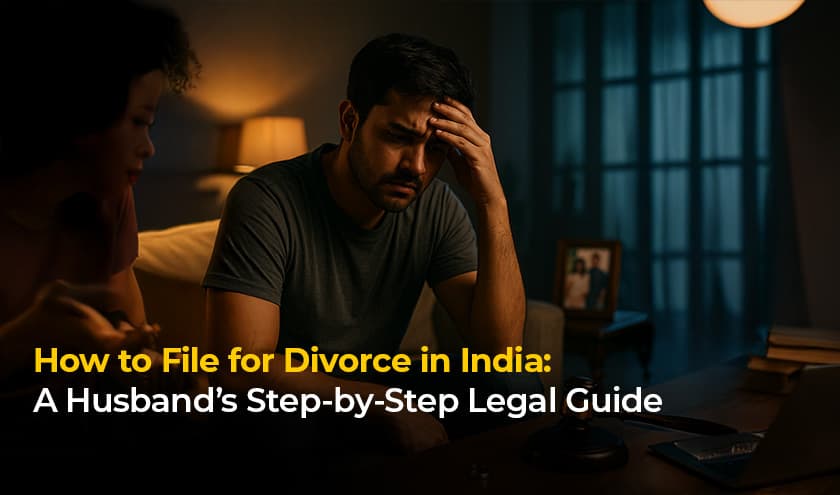How to File & Apply for a Divorce in India – Legal Requirements & Process | Full Legal Guide

Divorce is never an easy decision. For many couples, the process can feel overwhelming — from understanding the legal requirements for divorce in India to knowing which family court has jurisdiction. If you’re considering separation, it’s crucial to know the right steps to protect your rights and future. This guide simplifies the divorce process in India and explains how experienced Divorce Lawyers in India can help.
In India, divorce is governed by personal laws (Hindu Marriage Act, Special Marriage Act, Christian Divorce Act, etc.), and the procedure can vary depending on whether it’s a mutual consent divorce or a contested divorce. This blog will walk you through the key legal requirements for divorce in India, the steps for filing a divorce petition, required documents, timelines like the cooling-off period, and important issues such as alimony and child custody. With VakeelSaab’s Divorce online consultation, you can make the process smoother and stress-free.
Types of Divorce in India
Mutual Consent Divorce
Under Section 13B of the Hindu Marriage Act and similar provisions in other laws, both spouses can jointly file for divorce. Key points:
- Both parties must agree to dissolve the marriage.
- They must have lived separately for at least one year.
- The cooling-off period is 6 months (can be waived by courts in certain cases).
- Matters of alimony, child custody, and property settlement must be mutually agreed upon.
Contested Divorce
When one spouse does not consent, a contested divorce procedure in India is followed. Grounds include:
- Cruelty: Physical or mental abuse.
- Desertion: Abandonment without cause for at least 2 years.
- Adultery: Extramarital relationship.
- Other grounds: Conversion of religion, mental disorder, venereal disease, or renunciation of the world.
Step-by-Step Divorce Process in India
- Consult a Divorce Lawyer: Get professional advice on your rights, options, and documentation.
- Prepare a Divorce Petition: File in the appropriate family court in India where marriage took place or where either spouse resides.
- Submit Required Documents: Marriage certificate, ID proofs, photographs, address proof, and evidence supporting the case.
- Court Proceedings: The court will hear both parties, examine evidence, and attempt reconciliation.
- Cooling-Off Period (for mutual consent): Minimum 6 months between first and second motions, unless waived.
- Final Decree: If satisfied, the court grants a divorce decree, legally ending the marriage.
Key Legal Requirements for Divorce
- The marriage must be valid under applicable personal law.
- Grounds must be established (for contested divorce).
- Proper jurisdiction must be chosen (family court divorce in India).
- All required divorce documents in India must be filed correctly.
Alimony, Maintenance, and Child Custody
Divorce often raises questions about financial and parental responsibilities:
- Alimony & Maintenance: Courts may grant one-time settlement or monthly support depending on income, lifestyle, and circumstances.
- Child Custody in Divorce: Decided based on the child’s welfare, not merely parental preference. Courts may grant joint custody, sole custody, or visitation rights.
Jurisdiction of Family Courts
A divorce petition in India must be filed in the family court of jurisdiction. Generally, this is:
- Where the couple last resided together.
- Where the marriage was solemnized.
- Where either spouse is currently residing.
Why You Need a Divorce Lawyer
Filing for divorce involves complex paperwork and emotional stress. A Divorce Lawyer in Delhi or other Indian cities can help you:
- File petitions correctly and avoid delays.
- Negotiate settlements for alimony and property.
- Ensure your rights in child custody disputes.
- Handle contested divorce hearings effectively.
Frequently Asked Questions (FAQ)
What is the minimum time for divorce in India?
For mutual consent divorce in India, the minimum time is 6 months, but courts may waive this period in special cases.
What documents are required to file for divorce?
You’ll need your marriage certificate, ID/address proofs, photographs, and supporting evidence (if contested).
Can I file for divorce online?
Yes, many family courts now accept e-filing, and divorce online consultation with lawyers helps streamline the process.
What happens if one spouse does not agree to divorce?
A contested divorce can still be filed on valid legal grounds like cruelty, desertion, or adultery.
If you are considering separation or already in the process, don’t go through it alone. At Vakeel Saab, our expert Divorce Lawyers in India offer personalized advice on mutual consent and contested divorces. Book your divorce consultation online today and protect your future with the right legal support.
Related Articles
The Importance of Consulting a Property Lawyer for Real Estate Issues
Blog
How to File a POCSO Complaint in India: Step-by-Step Legal Process
Blog
What punishments does the law give for giving, taking, or asking for dowry?
Blog
Reasons for the Increasing Divorce Rates in India
Blog
What is a Special Leave Petition? Meaning, Features, Process & & Who Can File?
Blog
What Is the Difference Between Mutual Divorce and Contested Divorce?
Blog